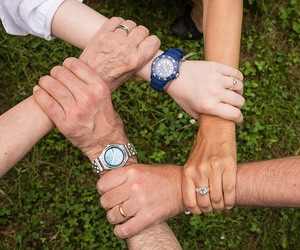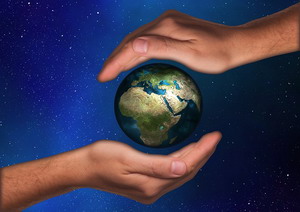
Last weekend Ellen and I went to an 80th birthday party for an old friend. The party was thrown by the Sai Baba society of Sacramento, which she has been very active in for a long time. The event was a beautiful collision of different faiths as the event was held in the Zoroastrian Temple and part of the music and program was provided by the Unity church – another of her active engagements. What followed was a four hour out-flowing of heart centered love and appreciation for this tiny bundle of giving energy. There was a lot of devotional singing, music, dancing, and story telling to celebrate this occasion.
Later, after the party was long over, the back burner in my brain was ruminating on the experience of love and what that all actually means. I revisit this subject every couple years to see what I have learned since my last visit. The last time I dove into this stream of awareness I grabbed the understanding of the vital participatory nature of love. Love is meaningless unless it is acted upon. Prior to that I appreciated the essential embracing of “what is” as a key to love. So my understanding of love the last couple years was summarized by the statement “Love is the willingness to participate with what is.”

This latest appreciation of what life was showing me was the element of selfless service in the depths of love. Here was a huge celebration of the birthday of a person whose life exemplifies service. Indeed, I feel the celebration was really about a celebration of being of service. You don’t see this kind of outpouring of appreciation given to selfish people. This was a celebration of love for one of the essential principles of love – selfless service.
As I was absorbing this perspective, a particular caveat jumped to the forefront of my mind – what does selflessness really look like? This can be as difficult to pin down as the word love. But the specific point of awareness brought to me was that in the context we are talking about, selflessness is not at all the image of self depreciation of the ascetic. Selflessness is not about self-denial. In this context we are referring to a self-perception of self as neither greater than nor less than anyone else. Loving others and loving self are two sides of the same coin. In the heart all is one. That means we are equal on a heart level. Each personality will have different degrees of maturity and adult skill development, but on a heart level we are all equals.

Self-love requires the development of excellent boundaries. To truly be of service to life you must first take care of your own needs. If you do not, then you will quickly be the one in need and simply become another burden to life. Service is designed to flow from our abundance, not deplete us and make us needy. Some people believe we should give all we have until there is nothing left. The belief that “suffering is good for the soul” has a well established tradition in most religions. I perceive this as a slight misperception. I see suffering as a necessary part of the maturation of each individual simply because suffering is what we experience when our stance with life does not work. Suffering is the internal feedback telling us to grow and change. So the perspective I would hold is that the avoidance of suffering through growth is what is actually good for the soul. The motivation created by the reality or the potential for suffering drives us to become more.
Why should we become more? Why aren’t we good enough just as we are? When we look into the eyes of a new born child and see that spark of divinity staring back at us we see perfection. Why do we not see that same perfection in their eyes when they are 16 and wanting to do what ever they want? My answer to that question is that as a new born they have not taken on the challenges of a mind, of emotions, of a body, and most

importantly of having to share the planet with others who all have needs and wants just like they do. That divine spark is perfect and lovable just as it is. It is all the rest that is added on that needs refinement and needs to grow up.
When sociologists study core values that organize various cultures, they find that every culture studied has certain values in common. These values come about simply because they work. Certain values replay over and over because they support the survival and thriving of the humans employing them. Respect is one of those core values – respect of property, of agreements, of the life of those around you. I see it as a deep appreciation of the fundamental equality each person has, that equality of the divine spark we each contain. This appreciation is the new piece to the understanding of love this recent introspection brought to the forefront.

So my new definition of love is“The willingness and action of participation from equality.” Although there may be plenty of desire from a state of narcissistic demand, there is no love. Love requires the opposite of the narcissistic view on life. Love requires seeing that my desires and your desires are equal. I am not entitled to demand you see things my way and you are not entitled to demand I see thing your way. That path is the path of power and fear – the opposite of love. Love is expressed as respect. This perspective takes a lot of behaviors that many of us think of as being loving and puts them somewhere else. For instance codependent care taking is not actually loving. It is a power struggle to make someone be the way you want (for their own good of course.)
Respect requires us to allow others to be responsible for the consequences of their own choices. When we jump in and “save” people from themselves or the circumstances they have created by their choices, we are denying them the opportunity to grow up and learn how to participate with life from love. Similarly, withholding consequences in the name of mercy or compassion is anything but compassionate. Instead you teach people that they do not need to participate with life in a respectful manner. You teach them they do not need to love through respectful participation to succeed in life.

I see the loving way to participate with others is to treat them honestly, respectfully, and equally. I allow people to make their own choices. I am not qualified to make their choices for them. I am not them and do not know what they are trying to learn by their choices. My job is to provide honest feedback to support their choice making process. That is why, in spite of being a doctor, I refuse to play the authority game. I can give, hopefully wise, counsel, but I do not tell people what to do. I do not see that as a loving thing to do, even when they want me to do this. This can become a puzzle for me. Is it compassionate or loving to feed a hungry man if all it teaches him is to be more demanding and expecting of free handouts? Does this not only drive him deeper into a feeling of helplessness and incapacity? How is that loving?
Compassion seems to be focused on relieving suffering and providing comfort and ease – concerns of the physical body. Love seems to be more heart or spirit focused and intent on creating connection and oneness through upliftment and empowerment. Though folks tend to think of compassion and love as the same, they seem to be quite different, but that may just be the way I am looking at them.

As you can see, my contemplation into “What is love?” is an ongoing process. I periodically get bits and pieces shown to me that I can add to my understanding. I have no illusion that I know the answer to this question, but the very question is a spiritual challenge that keeps me moving forward. Moving forward is enough for me.
